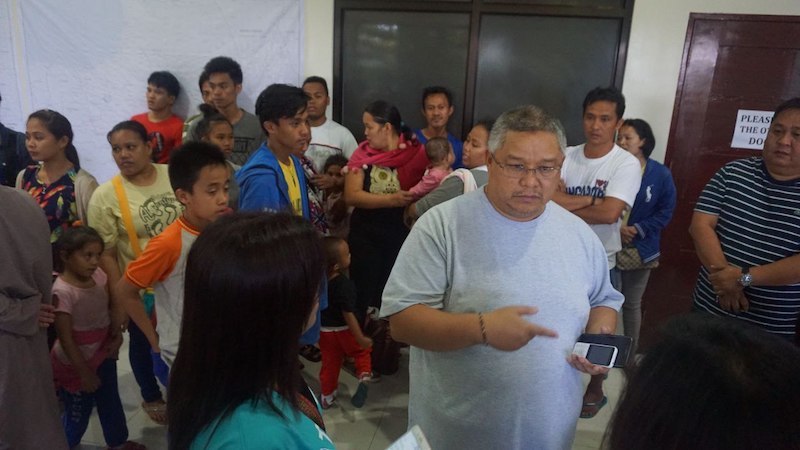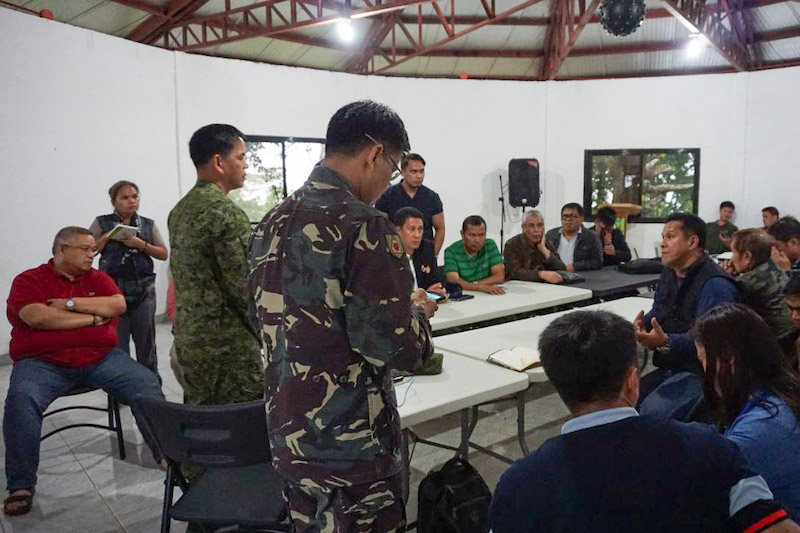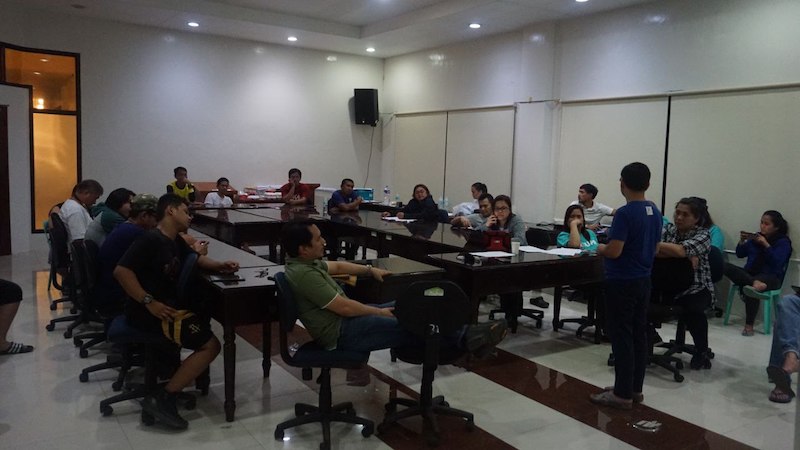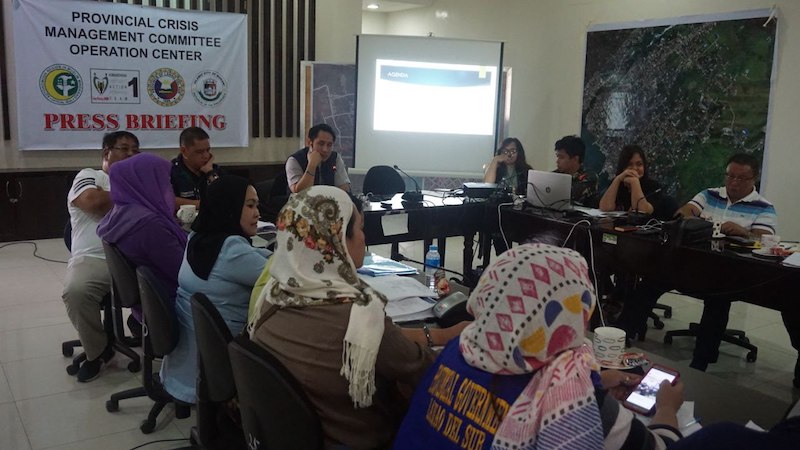
MARAWI CITY (MindaNews / 27 August) — Growing up, I was always protected by my family from danger, oppression, and violence which gave me a comfortable and secured life. But May 23, 2017 happened. It was the day when almost half of Marawi City was seized by the Maute Group, an ISIS-inspired local terrorist group. And I found myself right in the middle of it.
My job in the Provincial Government of Lanao del Sur in Marawi City involves informing our constituents of our plans, policies, and programs, and coordinating with different government agencies. One of these agencies is the military.
Since 2015, we had been receiving intelligence reports that the Maute Group will take over Marawi City, the only Islamic city in the Philippines, and kill all the non-Muslims residing there. We did not place much importance to this intel because we did not really believe that a group of Muslims could possibly harm their fellow Muslims.
On the first day of the siege, my team and I were out of town for field work. While we were in a coffeeshop in another city after our inspection duties, we received word that a part of Marawi City was being burned down by the Maute Group. The City Jail, the Dansalan College, and a couple of mosques were on fire.

My team and I travelled to Iligan City to converge with then Governor Soraya Adiong and her son, Mamintal “Bombit” Adiong, then Vice Governor, to make sense of what was going on. Both were in that city for a meeting.
The Maute Group was waging war against the military and the local government at the expense of innocent civilians. I called up my friend, Harold Clavite, who was then the Director General of the Philippine Information Agency and told him what was happening. He connected me to National Defense Secretary Delfin Lorenzana who spoke to Vice Governor Adiong afterwards. President Rodrigo Duterte then declared martial law in Mindanao.

Vice Governor Bombit said he was going to Marawi City the following day with his security and male relatives. I suddenly blurted out that I was coming too with my staff (composed of three women and two men). I did not have the heart to leave my boss in this situation even if it meant endangering my life. I felt an adrenaline rush that obscured any feeling of fear and doubt.
As we were entering Marawi, there was a huge traffic on the other side of the road because all the residents of the city were running away from the ongoing firefight between the terrorists and the Philippine Army. They were leaving Marawi while we were entering a war zone, not knowing what our fate would be. We went to the military camp adjacent to the Provincial Capitol and met with military officials. Vice Governor Adiong said he will stay in the Provincial Capitol until the firefight ends no matter how long that would be. I was thinking about my children in Cagayan de Oro City where we lived but I assured myself they were 103.4 kilometers away from the firefight.

It was on that day when we decided to activate the Provincial Crisis Management Committee (PCMC) with the help of then Regional Governor Mujiv Hataman of the Autonomous Region in Muslim Mindanao. I was asked to head the PCMC secretariat with my staff. Even though we were clueless about the job suddenly placed on our laps, my staff and I agreed.
On the third night of our stay at the Provincial Capitol, one of the guards rushed to us and said they heard a group of men approaching and shouting, “Allahu Akbar” (“Allah is Great!”). We immediately armed our men with the available guns we had. We hid Vice Governor Adiong in my office with six women guarding him, me included. He tried to make light of the situation by showing us a small pistol and saying not to worry as it will protect us all. I was thinking that the ISIS will have to kill me first before they can get to my boss. I did not know where I got that courage, but I felt it with all my being. The security guard came back to us and informed us that the people shouting were Muslim soldiers who had just arrived from another province. We all heaved a sigh of relief.

As head of the PCMC Secretariat, my team and I made sure that important stakeholders composed of social workers, educators, medical officers, human rights workers, military, police, and key heads of offices of the Provincial Capitol became a part of the PCMC. They provided recommendations in terms of humanitarian assistance. Our Provincial Disaster Risk Reduction and Management team rescued and attended to hostages and buried the many people who died from the firefight. Provincial Social Work and Development Officer Maharlanny Alonto provided relief goods to the internally displaced persons who sought refuge inside the Provincial Capitol. We made sure that priority was given to women, children, and senior citizens, and there were also separate lines for women and men.
A cousin called me and said her father and brother were trapped inside the National Power Corporation (NPC) compound. She pleaded to me to rescue them. I quickly took a white cloth and wrapped it around my arm, and then placed a white flag on my government-issued vehicle. My officemates tried to stop me because there were snipers and stray bullets everywhere as the firefight was getting intense. Once again, I felt that adrenaline rush and signaled to my driver to move. An officemate jumped in the car with me.
When we arrived at the NPC, a group of soldiers appeared from nowhere and pointed their guns at us. I waved my little white flag and showed them our government car. I told them we were rescuing a senior citizen and his son inside the NPC. They let us pass with suspicion written all over the faces. We called the phone number provided to us and out emerged the two from the NPC compound. We quickly drove them to the Provincial Capitol.

During the siege, one of my tasks as head of the PCMC secretariat also involved coordinating with the military regarding our plans and activities. These military officers have remained good friends of mine till this day. When people ask me how I was able to have a good rapport with the security sector, I simply said I spoke to them honestly and raised concerns and practical suggestions that would make their job of protecting the province easier. I also coordinated with them daily during the siege to ensure we were all on the same page.
The Marawi experience made me realize that women can really help prevent or resolve conflict due to our innate communication, mitigation, and negotiation skills. Most of us are also inherently caring, sensitive, and intuitive and therefore, we know how to avoid conflict with people we are dealing with.
Marawi City was liberated on 17 October 2017, leaving more than 300,000 internally displaced persons. By then, we had built a system that paved a way for the recovery and rehabilitation of the city to begin with the help of the national, regional, and local governments, individuals, private sector, and national and international organizations, such as the United Nations agencies, that came to provide humanitarian support.
In 2018, we created the Provincial Technical Working Group for the Prevention and Transformation of Violent Extremism. I was again tasked to serve as a member and the head of its secretariat. The TWG is composed of religious and traditional leaders, non-government organizations, civil society organizations, academicians, and certain government offices. It formulates programs and policy recommendations on peacebuilding and public safety to be included in our mandated Provincial Peace and Order and Public Safety (POPS) Plan. We also formulated the Kalilintad (“peace”) Roadmap with the help of the United Nations Development Programme. We are bent to prevent any terrorist from wreaking havoc in our province again.

During the Marawi siege, we witnessed women IDPs suffering the most. Because of this, some of our programs, projects, and activities in both the POPS Plan and Kalilintad Roadmap are for women, especially mothers. These included the construction of shelters for abused children, battered women, and youth offenders. In 2022, we had a groundbreaking ceremony for our Residential Care Facility for women. We are also currently constructing a Halfway House for rebel returnees. These facilities would have been fully constructed in 2020 if the CoViD-19 pandemic did not shockingly emerge and halt all our plans and programs.

After experiencing a war which could have cost us our lives but instead developed resilience in us, we commit to do our best for our constituents to live in peaceful, resilient, and developed communities. This can be attained through conflict resolution, mediation, negotiation, and partnerships with stakeholders working for peace and development within and outside of our province.
With documents such as the ASEAN Regional Plan of Action on Women, Peace and Security, and the Philippine National Action Plan on PCVE, we are even more guided. We know that peace is everybody’s daily mandate, not just ours.
(OUR Marawi is open to anyone who wishes to share his/ her thoughts on the Marawi Siege and its aftermath. Salma Jayne Alonto Tamano heads Lanao del Sur’s Provincial Information Office).







